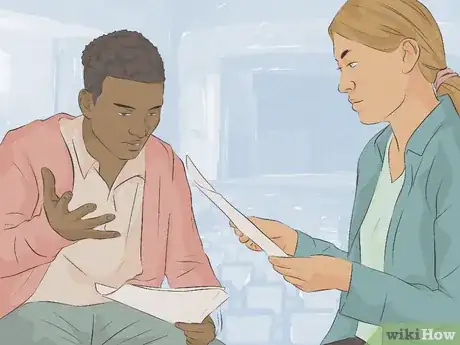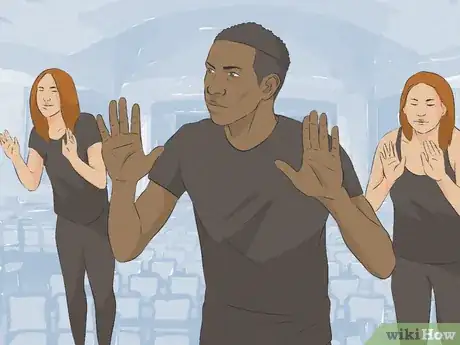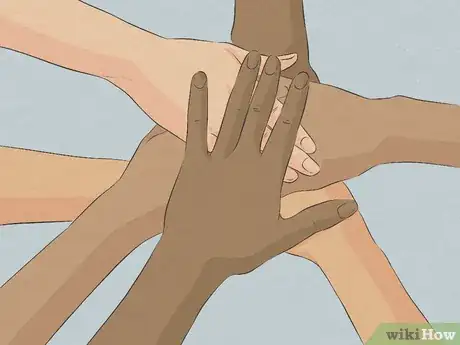This article was co-authored by Dan Klein. Dan Klein is an improvisation expert and coach who teaches at the Stanford University Department of Theater and Performance Studies as well as at Stanford's Graduate School of Business. Dan has been teaching improvisation, creativity, and storytelling to students and organizations around the world for over 20 years. Dan received his BA from Stanford University in 1991.
wikiHow marks an article as reader-approved once it receives enough positive feedback. In this case, several readers have written to tell us that this article was helpful to them, earning it our reader-approved status.
This article has been viewed 199,830 times.
Improv – short for improvisation – is a form of live theater (typically comedy) in which the plot, characters and dialogue are made up on the spot. Improv requires a great deal of creativity, teamwork, and practice, but becomes one of the most entertaining forms of theater when done well. To get started with your improv career, you'll need to learn a few basic principles and commit to a bit of hard work.
Steps
Learning Improv
-
1Join an improv class. If you're considering getting into improv, the best way to know for sure is to take a class. Joining an improv class will teach you more about the genre and give you all of the necessary tools you'll need to be a successful improv actor. There are different levels of improv classes, including a beginner's level, so don't be afraid to join a class.
- Even if you end up not pursuing improv, taking a class can be a great way to gain self confidence, improve your communication skills, meet new friends, and spark your other areas of creativity.
- Improv classes can be found in almost every city, so look online to find a class near you. If you decide that you're serious about pursuing improv, you should consider moving to a city that is known for it's comedy scene. Some of these cities are Chicago, Los Angeles, and New York City.
- Take a free class with a friend. Some theaters offer free classes to help promote their new classes or their upcoming season.
- Go to classes as often as you can and practice regularly.
-
2Learn the "Yes, And" rule. This is also called the 'Don't Deny' rule. This rule means that you should always say yes. If the person you're working with has an idea, build upon what they have created. Do not deny the scenario they have set up, just go with it. Even after you've gotten good at improv, this basic rule should still be followed.
- If your scene partner starts the scene by stating that you two are pirates, then you must embrace that you two are pirates. If you deny that you're a pirate, you will discredit your scene partner and cause tension in your scene.
Advertisement -
3Follow the positivity rule. It's a good idea to always start scenes on a positive note. When a scene begins positively, there are many more directions for the scene to go. However, if a scene begins on a negative note, it doesn't have much room to grow. Scenes that start negatively usually result in the characters fighting or dying.
- For example, if you start a scene by saying "Nobody likes you at school, they think you're so weird," there isn't much that can be done with that scene besides an argument. However, if you say "Everyone at school thinks you're so weird, but in a cool way," the scene has room for growth. You can talk about how your character is different, what makes it cool, etc. Make positive statements to allow your scene partners to embrace their characters.[1]
-
4Focus on teamwork. Collaboration is the key to successful improv; you cannot create a successful improv scene on your own. Everyone that is a part of a scene must work together and support one another, otherwise the scene will not work. Embrace each other's ideas, give everyone a chance to shine, and give each other opportunities to enhance the scene.
- Focus on the overall scene as opposed to your role in the scene. If everyone wants what's best for the scene, they'll be more willing to share the spotlight and let each character have their shine.
-
5Work with an improv partner. In improv, it's important that you learn how to work well with others, as you'll be creating scenes and scenarios off of one another. When you're working with a partner, both of you should get the same amount of shine. Don't try to upstage your partner, but don't let them outshine you either. Practice working with others so that you can understand a good balance of give and take when doing improv with a partner.[2]
Watching Improv Comedy
-
1Go to local improv shows to study other performers. You can learn a great deal from watching both bad and good improv. When you go to improv shows, pay attention to what works well on stage and what doesn't. Pay attention to how the audience responds to certain things. Get ideas about characters and personalities that you can develop for your improv.
- Going to local comedy shows will also help people become familiar with you. Immersing yourself in the scene is a great way to meet other improv actors and comedians.
- Most big cities have at least one improv comedy club, but if you're looking for an amazing local comedy scene, you may want to consider relocating to Chicago, LA, or NYC.
- Some well known improv comedy clubs include Second City, Acme Comedy Theater, ComedySportz, Brave New Workshop, The Bad Dog Theater Company, and Groundlings, just to name a few.
-
2Learn from watching improv and sketch comedy on TV. Watching these shows will allow you to study some of the best improv comedians and learn what makes a good improv performer. Study the good and the bad, and apply what you've learned when you practice.
- Some good improv and sketch comedy shows to watch are Saturday Night Live (SNL), Whose Line is It Anyway, Wild 'N Out, In Living Color, Mad TV, and Chappelle's Show.
- Keep in mind that most of these performers started on a local level as well. They got better over time, and so will you if you apply yourself.[3]
-
3Watch your friends practice improv. Hang out with the friends that you've met in improv class and watch each other practice. Although it's important for you and your improv friends to work together, it's just as important to watch each other from an outsiders point of view. If you and your friends take turns observing each other, you'll be able to provide feedback from the audience perspective.
Breaking Into Improv
-
1Perform in improv shows. The best way to get experience with improv is to perform. Practicing is important, but performing in front of an audience brings another element into the mix. Many improv shows feed off of the audience, so it's important to experience doing improv in front of an audience.[4]
-
2Take advanced improv classes. As your improv skills progress, you should switch to a more advanced class. This will allow you to work with better improv actors and new instructors, and will also push you to improve your improv chops.
- Advanced improv classes often come with other perks, such as workshops with successful actors, discounted or free tickets to professional improv shows, and assistance with head shots and resumes.[5]
- Head shots are professional photos that actors submit to casting directors when auditioning for roles. Resumes list all of an actors experience and are turned in with their head shots at auditions. When you are ready to start auditioning for different roles, be sure to get your own head shot and resume.
-
3Build good relationships with your improv teachers and fellow students. Many improv teachers are known and respected in their local comedy scenes, so it's a good idea to develop your relationship with them. If your teachers see that you're taking improv seriously, they may be willing to introduce you around or set up some auditions for you.
- Volunteer often in class to show that you enjoy participating.
- Attend your teacher's comedy shows outside of class.
- Ask your teachers what additional things you can do to practice, perform, and immerse yourself in the improv scene.
-
4Perform improv skits in front of your friends or family. If you don't have a real audience to perform in front of, gather some friends and family to be your audience. This will be a good way for you to practice in front of an audience and get comfortable doing improv in front of others.
- This can be as simple as playing playing a game of charades with a group of loved ones. It will be a fun time and will allow you to exercise your improv and teamwork skills.
-
5Apply your improv skills in your every-day life. We all have families, we all have friends, we all have our own lives. Apply improv in your daily routine. Almost all up-and-coming comedians have to keep day jobs to pay rent, so don't be embarrassed that you have one as well. Many jobs will allow you to practice improv throughout the day, so take advantage of those opportunities.
- Teaching people is a great way to improvise. Whether you're teaching students, your children, or your friends, try to teach them something new. Each person learns differently, so you'll have to adapt to them as you teach them.
- Believe it or not, you can practice your improv skills while working with customers or coworkers. Learning how to interact with your customers and pitch a product is all part of acting and improvising, as is working with difficult coworkers.[6]
Expert Q&A
Did you know you can get expert answers for this article?
Unlock expert answers by supporting wikiHow
-
QuestionWhat makes good improv?
 Dan KleinDan Klein is an improvisation expert and coach who teaches at the Stanford University Department of Theater and Performance Studies as well as at Stanford's Graduate School of Business. Dan has been teaching improvisation, creativity, and storytelling to students and organizations around the world for over 20 years. Dan received his BA from Stanford University in 1991.
Dan KleinDan Klein is an improvisation expert and coach who teaches at the Stanford University Department of Theater and Performance Studies as well as at Stanford's Graduate School of Business. Dan has been teaching improvisation, creativity, and storytelling to students and organizations around the world for over 20 years. Dan received his BA from Stanford University in 1991.
Improvisation Coach 'Yes, and' is probably the most familiar maxim of improvisation, and there are two parts. The "yes" means that you accept any idea your partner or the audience gives you, and the "and" means that you add to that idea. People mess up when they say "yes" but they really mean "no," or they say "and" then add in an idea that they thought of before instead of embracing the new direction.
'Yes, and' is probably the most familiar maxim of improvisation, and there are two parts. The "yes" means that you accept any idea your partner or the audience gives you, and the "and" means that you add to that idea. People mess up when they say "yes" but they really mean "no," or they say "and" then add in an idea that they thought of before instead of embracing the new direction. -
QuestionWhat is the goal of improv?
 Dan KleinDan Klein is an improvisation expert and coach who teaches at the Stanford University Department of Theater and Performance Studies as well as at Stanford's Graduate School of Business. Dan has been teaching improvisation, creativity, and storytelling to students and organizations around the world for over 20 years. Dan received his BA from Stanford University in 1991.
Dan KleinDan Klein is an improvisation expert and coach who teaches at the Stanford University Department of Theater and Performance Studies as well as at Stanford's Graduate School of Business. Dan has been teaching improvisation, creativity, and storytelling to students and organizations around the world for over 20 years. Dan received his BA from Stanford University in 1991.
Improvisation Coach
-
QuestionHow can I make my partner look better in improv?
 Dan KleinDan Klein is an improvisation expert and coach who teaches at the Stanford University Department of Theater and Performance Studies as well as at Stanford's Graduate School of Business. Dan has been teaching improvisation, creativity, and storytelling to students and organizations around the world for over 20 years. Dan received his BA from Stanford University in 1991.
Dan KleinDan Klein is an improvisation expert and coach who teaches at the Stanford University Department of Theater and Performance Studies as well as at Stanford's Graduate School of Business. Dan has been teaching improvisation, creativity, and storytelling to students and organizations around the world for over 20 years. Dan received his BA from Stanford University in 1991.
Improvisation Coach When you collaborate in improv, you are not just going along with your partner's idea — you are sharing the responsibility. There are three pieces of collaborating in improvisation. First, make offers to inspire your partner. Second, accept offers to make your partner look good. And third, be there with and for your partner, no matter how it goes. You may get glory or you may go down in flames together, but do not leave your partner in any case.
When you collaborate in improv, you are not just going along with your partner's idea — you are sharing the responsibility. There are three pieces of collaborating in improvisation. First, make offers to inspire your partner. Second, accept offers to make your partner look good. And third, be there with and for your partner, no matter how it goes. You may get glory or you may go down in flames together, but do not leave your partner in any case.
References
- ↑ http://www.rookiemag.com/2014/09/sandys-improv-guide/
- ↑ http://www.backstage.com/advice-for-actors/backstage-experts/11-improv-audition-tips/
- ↑ http://www.rollingstone.com/tv/lists/40-best-sketch-comedy-tv-shows-20150327/monty-pythons-flying-circus-1969-1974-20150325
- ↑ http://www.dangoldstein.com/howtoimprovise.html
- ↑ http://www.secondcity.com/courses/chicago/general-information/#being-a-student
- ↑ https://takelessons.com/blog/improv-acting-tips
About This Article
Improv comedy is a type of live theater where you make things up as you go along instead of using a script. To get started with improv comedy, go to a local improv class, where you'll learn the ropes. Classes are also great for practicing with new people and will help you get more confident performing improv. You can find inspiration for your own sketches by watching live improv and TV shows like ‘Whose line is it anyway?’ If you want to break into the improv industry, start to perform in shows so you can make professional contacts. Build strong relationships with your teachers and other actors, which can lead to new opportunities. For more tips from our Improv co-author, including how to keep an improv scene going, read on!








































































